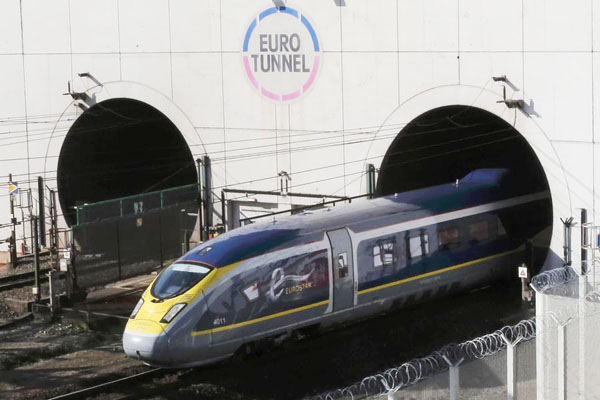China offers UK a model to get trains up to speed
- By Chris Peterson
 0 Comment(s)
0 Comment(s) Print
Print E-mail China Daily, January 9, 2017
E-mail China Daily, January 9, 2017
|
|
|
A new high-speed Eurostar e320 train leaves the Channel Tunnel in Coquelles, near Calais, northern France, October 20, 2015. [Photo/Agencies] |
If you want to travel from Kunming, capital of Southwest China's Yunnan province to East China's Shanghai, a distance of 2,252 kilometers, it will take you 11 hours and 15 minutes-and you can bet your train will leave and arrive on time.
If you want to travel the 664 km from London to Edinburgh, it will take you nearly five hours, the train will often be delayed and you will have to pay extra to guarantee a seat.
Traveling on China's new high-speed, state-of-the-art trains costs you an average of 100 yuan an hour, traveling at around 350 km/h. Roughly put, it means the ticket between Kunming and Shanghai should cost you about 1,115 yuan ($162) at current prices.
Taking that shorter London-Edinburgh route, which can turn into a nightmare journey, will cost you around 150 pounds sterling, about 1,272 yuan at the current exchange rate.
For the country that invented railways (1825, George Stephenson's Stockton-to-Darlington line in northeast England, in case you ask), Britain has not done them proud.
And if strikes, delayed engineering works, malfunctioning signals and poor infrastructure weren't enough, the government has just announced a 2.3 percent rise in rail fares across the board.
I commute to work every day and, as things go, I'm luckier than most. Southeastern, which operates my service, is a little better than some of the other operators, although each time I climb the stairs from the car park I seem to be greeted by "Southeastern apologizes for ...", followed by the latest delay, excuse or cancellation.
Reasons offered include unruly passengers, ice, snow, rain, leaves on the line, missing train crew and, believe it or not, strong winter sunshine in the drivers' eyes.
I've always loved trains, especially the mystery of steam. I confess to having a box full of Hornby Dublo model engines, those splendidly made electric models of the golden era of British steam. I have beautifully detailed models of the Flying Scotsman, the Duchess of Hamilton and designer Sir Nigel Gresley's Mallard, a streamlined monster that set the world speed record for a steam engine in 1938 and that has never been beaten.
I suppose it goes back to my childhood in the 1950s, when my father would take my mother and his sister by car (a 1937 Austin 14) from Oxford to Hartlepool, while we boys would go with my uncle by steam train, changing at Darlington for the two-hour run to West Hartlepool.
What a trip-chocolate, pork pies, fizzy drinks and a fresh comic book for the journey. Boyhood heaven.
All that, of course, was spoiled by a gentleman called Dr Richard Beeching, whose 1963 report on the state of Britain's railways resulted in a shortsighted slashing of 2,636 stations and 5,000 miles of track.
Britain's rail system has never recovered.
Since then, the nation's rail network has become a political football. Of all the public facilities, railways should be run by one central entity-it doesn't really matter if it is a state or private body.
After all, China, France and Germany, to name but a few places, all have one entity controlling their rail systems and their railways seem to work just fine.
Here, although the infrastructure is run by Network Rail, the services are run by a series of franchises awarded by the government, with varying degrees of success.
Try to buy a ticket and you will be faced with a bewildering array of choices.
No wonder many Britons opt to drive, overcrowding the motorways and adding to pollution.
Next time I'm in China, China Railway Co will be getting my business, that's for sure.
The author is managing editor of China Daily European Bureau.







Go to Forum >>0 Comment(s)